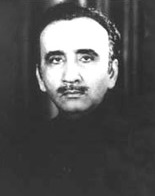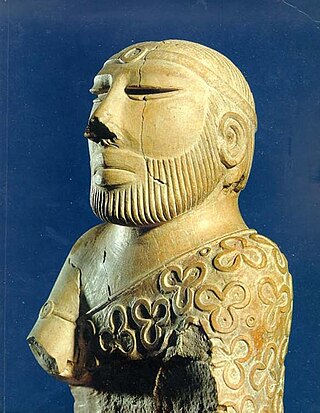This article needs additional citations for verification .(February 2024) |
| |||||
| Decades: | |||||
|---|---|---|---|---|---|
| See also: | |||||
Events from the year 1985 in Pakistan.
This article needs additional citations for verification .(February 2024) |
| |||||
| Decades: | |||||
|---|---|---|---|---|---|
| See also: | |||||
Events from the year 1985 in Pakistan.

Muhammad Zia-ul-Haq was a Pakistani military officer who served as the 6th president of Pakistan from 1978 until his death in 1988. He rose to prominence after leading a coup on 5 July 1977, which overthrew the democratically elected government of prime minister Zulfikar Ali Bhutto. Zia subsequently imposed martial law, suspended the constitution, and served as chief martial law administrator before assuming the presidency. Zia served as the 2nd chief of the Army Staff from 1976 to 1988, a position he later leveraged to execute a coup in 1977, which was the second coup in Pakistan's history of coups; the first occurred in 1958 under Ayub Khan.
The Eighth Amendment to the Constitution of Pakistan allowed the President to unilaterally dissolve the National Assembly and elected governments. The National Assembly of Pakistan amended the Constitution of Pakistan in 1985 and the law stayed on the books until its repeal in 1997.

The Pakistan Muslim League, is the name of several different Pakistani political parties that have dominated the centre-right platform in the country.
Ghulam Ishaq Khan, commonly known by his initials GIK, was a Pakistani bureaucrat, politician and statesman who served as the seventh president of Pakistan from 1988 to 1993. He previously served as Chairman of the Senate from 1985 to 1988 under president Muhammad Zia-ul-Haq, and was sworn in shortly after Zia's death.

Mohammad Khan Junejo was a Pakistani politician and statesman who served as the tenth Prime Minister of Pakistan from 1985 to 1988 under president Muhammad Zia-ul-Haq. During his tenure as prime minister he sought to strengthen the power of the office and assert civilian control over state affairs, foreign affairs and military appointments, coming into conflict with Zia-ul-Haq and various senior military officers eventually culminating in his dismissal by Zia. His inquiries into the Ojhri Camp Disaster, appointment of Aslam Beg as VCOAS, various Corps Commanders, growing control over senior military promotions, forays into international politics, rejecting Zia appointments in his cabinet, stance against martial law, austerity policies and purported spying on Zia through the civilianized Intelligence Bureau all contributed to the souring in their relation.
Events of the year 1986 in Pakistan.
Events from the year 1977 in Pakistan.
Events in the year 1988 in Pakistan.
The political history of Pakistan is the narrative and analysis of political events, ideas, movements, and leaders of Pakistan. Pakistan gained independence from the United Kingdom on 14 August 1947, when the Presidencies and provinces of British India were divided by the United Kingdom, in a region which is commonly referred to as the Indian subcontinent. Since its independence, Pakistan has had a colorful yet turbulent political history at times, often characterized by martial law and inefficient leadership.
Events from the year 1987 in Pakistan.

Sardar Ghulam Muhammad Khan Mahar was chief of the Mahar tribe, and a prominent politician and philanthropist of the Sukkur District. He was first elected as a member of National Assembly of Pakistan in 1964. He became senator in 1973 with the Pakistan Peoples Party (PPP). He was elected a member of the National Assembly in 1977 general elections as the PPP candidate from NA-152 Sukkur II, he was elected Chairman District Council Sukkur in 1979 and remained until 1983. He was Minister for Agriculture when General Muhammad Zia-ul-Haq was the Martial Law Administrator. He won general elections of March 1985 as an independent candidate, and remained Minister of State for Health from 22 December 1986 to 29 May 1988 in Prime Minister of Pakistan Muhammad Khan Junejo's cabinet. In 1988, post Gen Muhammad Zia-ul-Haq era elections, he was defeated by Pakistan Peoples Party (PPP's) candidate Mian Abdul Haq Alias Mian Mitho. He became a member of National Assembly once again in October 1993 by contesting general elections from NA-152 as the candidate of Pakistan Muslim League (N) and afterward he died in April 1995.

Military coups in Pakistan began in 1958 when military officer Muhammad Ayub Khan overthrew and exiled president Iskandar Ali Mirza. Since its creation in 1947, Pakistan has spent several decades under military rule. After their respective terms in office, each of the past five prime ministers of Pakistan has faced convictions or imprisonment. This trend highlights a significant aspect of Pakistan's political landscape: the prevailing rule that the Pakistani military exercises influence wherever it deems necessary, often persisting despite potential repercussions. Throughout Pakistani history, the military has played a prominent role in governance, with periods where it has directly ruled the country.

The Martial Law Administrator of Balochistan was the head of the military regime of Balochistan, the largest province of Pakistan. The capacity was first established when martial law was imposed by General Yahya Khan, who appointed Riaz Hussain to the post, but was never officially ratified. It therefore lapsed when Yahya resigned. The post was officially in operation from July 1977, when martial law was imposed again, until late 1985, when it was informally terminated upon the lifting of martial law by Prime Minister Muhammad Khan Junejo. The martial law administrator was a serving Lieutenant General of the Pakistan Army, appointed by the Chief of Army Staff. General Muhammad Zia-ul-Haq was the incumbent in each instance. When the presidential term of Fazal Ilahi Chaudhry ended, the post assumed the political office of Governor of Balochistan; the civilian Chief Justices who were acting as governors of the provinces were replaced by their martial law counterparts. Of the three officeholders, none completed their designated term.

General elections were held in Pakistan on 16 November 1988 to elect the members of the National Assembly and Senate.

General elections were held in Pakistan on 25 February 1985 to elect members of the National Assembly. The elections were held under the military government of Muhammad Zia-ul-Haq after the restoration of the 1973 constitution.
Ghulam Jilani KhanHI(M) SBt was a senior general of the Pakistan Army who served as the 14th Governor of Punjab Province and 11th Defence Secretary of Pakistan in the military government of President General Zia-ul-Haq.

Agha Syed Hamid Ali Shah Moosavi was the patron-in-chief of the supreme Shia ullama board and president of Tehrik-e-Nafaz-e-Fiqah-e-Jafaria, the Shiite-law implementation movement. His family is descended from Imam Musa al Kadhim, the seventh imam of Twelver Shias. Moosavi became president of Tehrik-e-Nafaz-e-Fiqah-e-Jafaria of Pakistan after the death of Mufti Jafar Hussain.

Indirect presidential elections were held in December 1988 to elect the 7th President of Pakistan. The votes were given by the Electoral College of Pakistan, which had its new members in both national and provincial assemblies elected in the corresponding 1988 Pakistani general election.

The Junejo government was formed on April 10, 1985, when Muhammad Khan Junejo became the prime minister of Pakistan. His tenure began under the influence of military president Muhammad Zia-ul-Haq, who maintained control over key appointments, including several federal cabinet ministers.